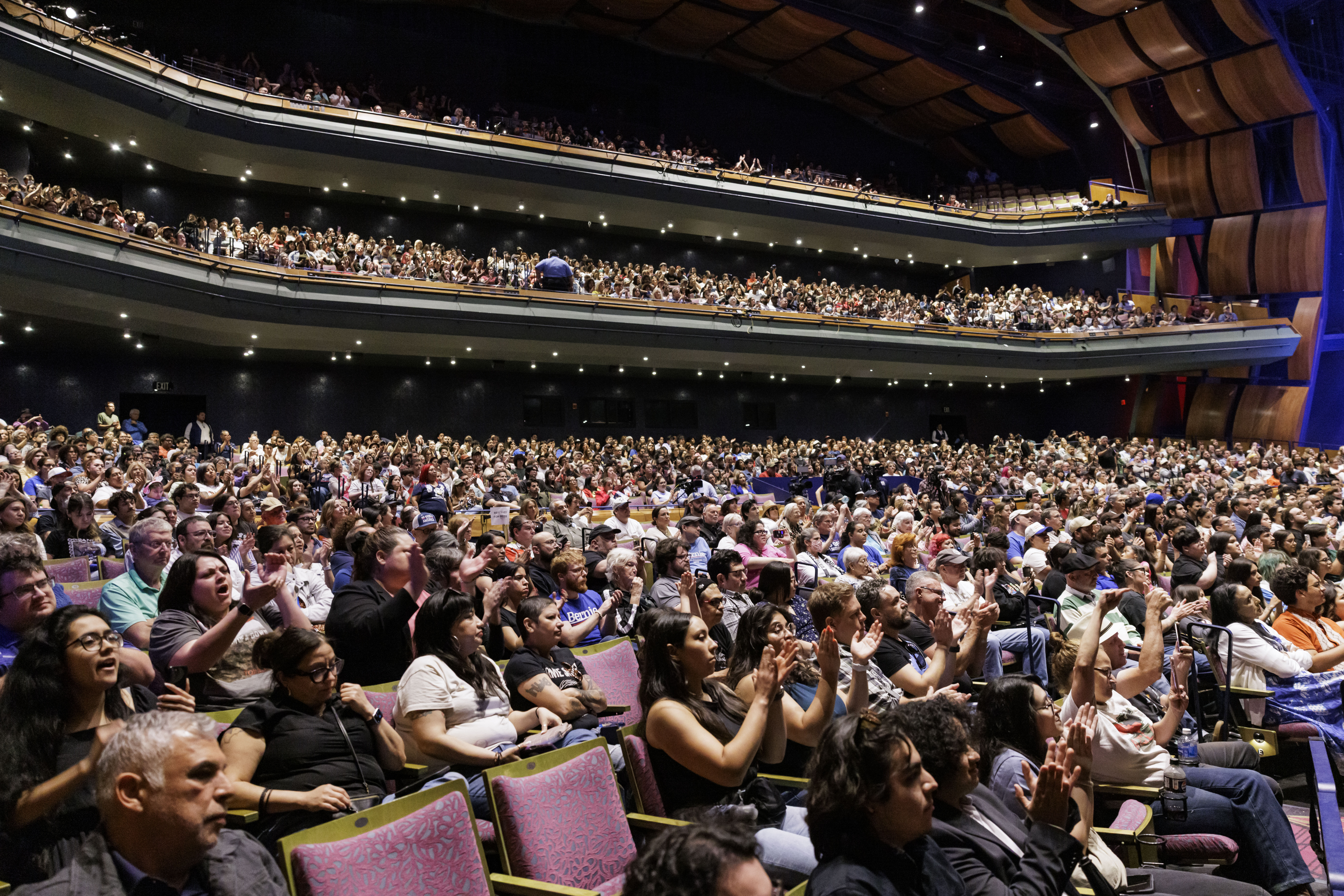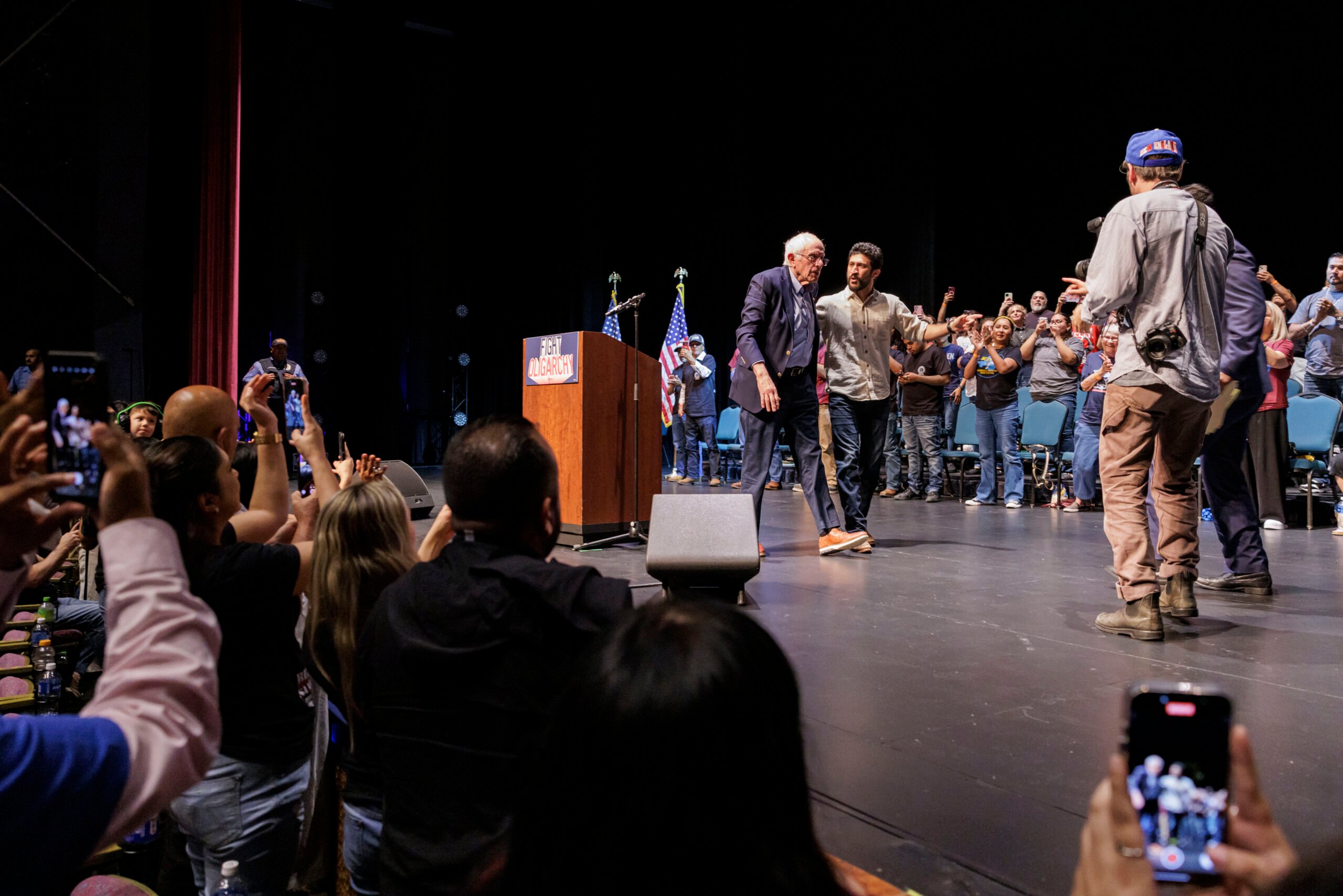As a rainstorm rolled in last Friday evening, hundreds of people eagerly filed through metal detectors at an 1,800-seat performing arts center in McAllen—the urban hub of Hidalgo County in Texas’ Rio Grande Valley—ahead of Vermont U.S. Senator Bernie Sanders’ 13th stop on his nationwide “Fighting Oligarchy” tour.
Normally a stage for orchestra concerts and comedy shows, the venue, located about five miles from the U.S.-Mexico border, filled up now for a different reason: People from every age group, worried about the country’s future under Donald Trump’s control, crowded in to hear Sanders and Austin Democratic Congressman Greg Casar rally up the working class.
“McAllen, Texas, can be the birthplace of a new Democratic Party that puts working people first, kicks out the corrupt politicians regardless of party, and saves our country for everyday people,” Casar said, as he spoke ahead of introducing Sanders.
The Valley, the four-county region of around 1.4 million mostly Latino residents at Texas’ southern tip, is no stranger to the controversial influence of billionaires like Elon Musk, whose company SpaceX has taken over what used to be Boca Chica Village and turned it into Texas’ newest city, Starbase, now mainly inhabited by SpaceX employees. Destroyed rocket parts litter Texan and Mexican beaches, and a recent SpaceX test ship exploded late at night startling nearby Brownsville residents and littering debris.
“Elon Musk does not own the Valley,” Casar—a second-term U.S. House member representing a district stretching from the capital city to San Antonio who was recently minted chair of the body’s progressive caucus—declared to the crowd.

Sanders’ nationwide tour to mobilize individuals especially in conservative regions comes amid increased uncertainty about further impacts of Trump’s policies on the working class. During a time of restructuring in the Democratic Party, following last year’s presidential election defeat, Sanders pushed a populist message urging unity and action against oligarchic control and highlighted the profound impact that Immigration and Customs Enforcement (ICE) raids have had in communities like the Valley.
“Right now in McAllen and other parts of this country we’re seeing what authoritarianism is about in its ugliest way,” the senator said. We’re seeing people being stopped on the street being picked up at their workplace, thrown into vans and taken God knows where without due process.”
Sanders continued: “What Trump is doing is not just waging an attack against the working class of this country. He is moving America very rapidly and dangerously into an authoritarian form of society.”
Since 2016, support for Donald Trump has increased steadily throughout previously deep-blue far South Texas. In that year’s presidential election, Hillary Clinton won all Rio Grande Valley counties in a landslide. In Hidalgo County, Clinton prevailed over Trump by 40 points. But, in 2020, Biden carried the county by only 17, and in 2024 Trump won it by three—part of a stunning sweep of all four Valley counties.
Jon Taylor, chair of the University of Texas at San Antonio’s political science and geography department, believes that despite Trump’s electoral performance in last year’s election, the Democratic Party still has ample opportunity to seize the narrative and use populism to appeal to voters’ frustrations and anger.
“Trump had this appeal to South Texas voters apparently because he’s strong, or he’s forceful,” Taylor told the Texas Observer. “I think Bernie might be really good at being able to just drive home that point about: What has it meant to you by voting for this guy? [Trump] cares about billionaires; he cares about megacorporations. He cares about giving all of them tax cuts and benefits.”
Despite increased support for Republicans in the region for almost ten years, Sanders was extremely popular during the 2020 Democratic presidential primary, in which he won every populous border county in Texas.
Hidalgo County Democratic Party Chair Richard Gonzales describes himself as a moderate Democrat and personally views the region’s makeup as conservative and family-based. The area’s long-time Democratic elected officials at all levels tend to be conservatives on issues ranging from fossil fuels to guns to abortion. No local elected officials spoke at the Sanders rally.
But Gonzales sees the appeal of progressive policies, saying he thinks they may be part of the recipe for turning his county blue again. “When we look at what Senator Sanders stands for, I think it’s starting to become more okay to kind of buy into that idea, because we’re seeing what the opposite can do to us down here,” he told the Observer.
Life in the Valley is largely a quiet existence, but near-daily ICE raids on local communities and workplaces have changed that. These aids have targeted businesses and construction sites from Brownsville to South Padre Island to McAllen. Notably, a bakery in Los Fresnos was targeted by ICE and HSI agents around mid-February, leading to multiple arrests including the owners. Pulgas once packed with people buying and selling goods including produce, antiques, and second-hand items are now oftentimes empty due to the fear of arrests by ICE agents. The Republican mayor of McAllen, Javier Villalobos, recently posted on Facebook that immigration enforcement is “negatively impacting all sectors of our economy” and called for the Trump administration to relax enforcement on all industries in need of labor.
Some locals at the Friday rally, like Michael Dutcher, expressed deep concern that their way of life is being threatened under Trump’s second administration. “Being a part of something to counter that is important to me,” Dutcher said. He had only heard of Sanders’ event hours before the start time and immediately made plans to attend.

Sergio Salinas, a business manager for the International Brotherhood of Electrical Workers Local 1015 in McAllen, showed up to the rally with several union members who sat on the stage behind the lectern. He referenced how Donald Trump threw around the word “union” on the campaign trail during last year’s election, yet he doesn’t believe that Republicans truly have the backs of unions. “The Republicans say that the unions are good, but where are they at?” Salinas said.
Standing beside vendors selling Bernie merch, attendee Danny Diaz, a local democratic precinct chair and longtime political organizer, said he hopes that change in the Valley’s political scene is soon to come.
“I don’t think Latinos in South Texas are married to the Republican Party,” he said. “I think people respond well to Bernie Sanders down here. … I am willing to bet that if we really absorb the energy like the energy that we saw tonight, that we could bounce back and sweep these counties back to the Dem side.”
The post Can Economic Populism Win Back the Rio Grande Valley? appeared first on The Texas Observer.
This post was originally authored and published by Michael Gonzalez from the , a nonprofit investigative news outlet and magazine. Sign up for their , or follow them on and .
























![43-Year-Old Erik Florer Dead in Hit-and-Run Crash on Laurel Canyon Boulevard [Los Angeles, CA]](https://www.nationwidereport.com/wp-content/uploads/2025/06/roland-denes-1217544-unsplash-683x1024-1-120x86.jpg)

